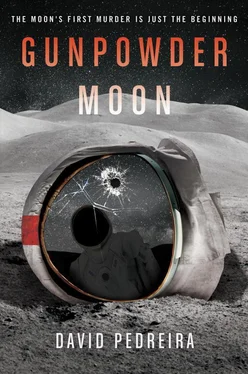David Pedreira
GUNPOWDER MOON
The Moon, Mare Tranquillitatis, 2072
Dechert stood at the crater rim and looked down. Dionysius was a monster—two miles deep and wide enough to swallow the isle of Manhattan—and with the light from the setting sun coming in too shallow to illuminate its depths, it looked as black as a well. What had Fletcher told him when he was training to take over the station? Oh, yeah:
Panic will kill you—and make you look like an asshole in the process.
Bold words, but Fletcher had never strapped a six-pack of thrusters to his spacesuit and jumped into the open mouth of a crater.
No one ever had.
Dechert clenched his toes to push blood into them, but pinpricks of frostbite continued to spider up his feet. He fiddled with his oxygen mix and stamped his legs and tried to digest the void beneath his boots.
“All right,” Quarles said into his helmet.
“Shit.”
“Shit what?”
“Nothing. Just warn me the next time you do that.”
“Do what?”
“Talk.”
“Okay. How do you want me to warn you?”
Dechert gritted his teeth. “Never mind. What do you want?”
“I was going to say things are looking good. Jets are in sync and ready to fire. Fly-by-wire and telemetry are online, angle of attack eighty-four degrees. You got your lamps on?”
“Yes.” Not like it matters.
“Good. Let’s make history. Forty seconds on my mark. And… mark.”
Forty seconds. Dechert took a dozen clumsy steps back from the rim wall, counting off the paces. He was afraid for the first time in a long time and the sensation wasn’t pleasant—a coppery taste in the mouth, a rush of awareness that reminded him of war.
“Thirty seconds.”
“This better not be a feed error, Quarles. If I find that drill still eating rock down there, I’m going to throw you out of an airlock.”
“Copy. Twenty seconds. Everything looks nominal.”
Blood rushed through Dechert’s ears. Nominal. What the hell does that mean? Is there a worse word in the English language? The fear held him now and he grasped for mental distractions, old pilot tricks, anything to stay focused. He skimmed the highlights of his career, checking the bullet points of his résumé as if they were flashing across the heads-up display in his helmet: six first flights through the mountain ranges rimming the Moon’s central maria, two lunar traverse distance records, command of a Level-1 mining station, a Silver Star for combat valor in the Bekaa Valley back on Earth. Was this the pedigree of a coward, some Terran tenderfoot? Could anyone doubt that he had the balls to make this jump, whether he was huffing too hard for air or not?
And yet here he was, doubting himself.
A muted alarm beeped in his helmet and Quarles’s voice poured into his headset, coming out of the ether from five hundred kilometers away: “Okay. Counting down from ten. One-zero, nine, eight, seven, six, five, four, three, two, one… mark. Step, and step, and firing.”
He needn’t have worried—as soon as Quarles said “firing,” Dechert was taking three running hops through the Moon’s microgravity. The thrusters on his suit lifted him from the crater wall. He looked beneath his boots at the blackness and drew his head into the back of his helmet.
“Three hundred meters and climbing,” Quarles said. “Ten seconds to apogee, twelve seconds to reverse thrust.”
The last dayside views of the Sea of Tranquility appeared as he ascended above the rimrock surrounding Dionysius. The vertical impact cliffs of Ritter and Sabine gleamed with ribbons of white ejecta to the southeast. The darker volcanic flatlands of the surrounding mare stretched to the horizon like dead African plains. He closed his eyes and waited for the heat of the sun to be taken away from him. It was a childish thing and he was angry as soon as he did it.
“Reverse thrust on my mark,” Quarles said. “Mark.”
Dechert fell. Lightness in his gut signaled the descent, a feeling that his body was dropping while his critical organs remained hovering above. He sucked in air and kept his eyes shut to escape from the flight and from the Moon itself, but it only increased his feeling of disorientation. Disembodiment. He focused on the sound of his breathing, the hiss of the regulators echoing in his helmet like a scuba diver finning through a current. Quarles wouldn’t need to read the biotel to know he was scared. He’d only have to listen. The Moon is soundless, and the air coming in and out of Dechert’s lungs rang with evidence against him.
“How we doing?” Quarles asked.
“Not good.”
“Don’t throw up in your helmet.”
“Good advice.”
“No problem. Four-zero seconds to hop one. Still looking nominal.”
“Right.”
They had selected Dionysius for Drill Station 7 because it had decent water trace, but also because it was accessible. It was relatively small and uniform for a lunar impact crater, an infant cosmic bullet strike of only a billion years or so, with a floor as smooth as a North American salt flat—or so the selenologists had promised. Of course, those selenologists were reading topo-maps back in New Mexico, so Dechert wasn’t overly comforted by their assurances.
He could have gone down to DS-7 in a shuttle with the extra security of a reinforced titanium seat and two tons of superalloy surrounding him, but the jetsuit had to be tested in a live mission, and he didn’t like putting his crew in prototypes. Anyways, it wasn’t the method that was important now. It was the mission. There was a mystery down in the crater black and a crisis that had to be resolved. The drilling station’s water rover had gone silent fourteen hours ago without any warning. There was no telemetry before the crash, and no data dump to the hydrogen reduction reactor or the station’s central computer. DS-7 provided a quarter of Sea of Serenity 1’s fresh water and oxygen. Its failure wasn’t catastrophic, but the circumstances of its demise—and more important, the timing—filled Dechert with dread. Why wasn’t there any telemetry before a total blackout? Quarles couldn’t figure it out and neither could Thatch, and they knew those systems better than they knew their own fingernails. The only plausible explanation was a micrometeor strike, but the chances of that happening were statistically negligible. It was as if a plug had been pulled… but plugs don’t get pulled on the open surface of the Moon.
Cold enveloped him. He opened his eyes in Moon shadow and had to blink to make sure they weren’t closed. On Earth, shadow isn’t much more than shade, a patch of cool retreat from the constancy of the sun. On the Moon it’s a pure black that can’t be described, and at the bottom of a shadow-sided crater you might as well be at the starless edge of the universe.
The plasma lamps on his helmet cast pinpoint beams of white that did little to obliterate the nothingness. Numbers flashing on the inside of Dechert’s visor told him that the crater floor was getting closer. The altimeter dialed backward like a clock flying into the past. He couldn’t see anything. I am a coward , he thought, pushing back a wave of low- g nausea. All the crazy shit I’ve done before, I was just trying to hide the goddamned truth.
“Why do I always get the first crack at your chickenshit prototypes?” he asked Quarles, needing to break the silence even though he knew the answer that was coming.
Читать дальше













